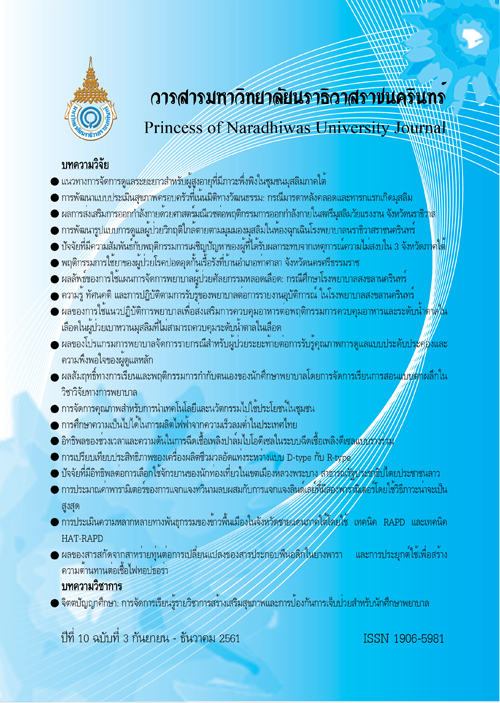The Effect of Implementing Clinical Nursing Practice Guideline for Dietary Control on Dietary Control Behavior and Blood Sugar Level in Muslim Patients
Keywords:
Clinical Nursing Practice Guideline, Dietary control behavior, blood sugar level, Muslim patients with uncontrolled DiabetesAbstract
This quasi-experimental research, two groups pre-post test design, were to evaluate the effect of
implementing clinical nursing practice guideline for dietary control on dietary control behavior and blood sugar level in Muslim patients with uncontrolled diabetes, who attended at Naradhiwasrajanagarindra hospital was performed. The subjects were divided into two groups. The control group (n = 30) were received usual nursing care, and the experimental group (n = 30) were received clinical nursing practice guideline for dietary control, were 1) The clinical nursing practice guideline for dietary control 2) The booklet to promote dietary control for Muslim patients with uncontrolled blood sugar, and 3) The education plan to promote dietary control. The duration of this study was 8 weeks. Data collecting tools were 1) The Demographic and Health Data Collecting Form, 2) The Dietary Control Behavior Questionnaire, testing reliability used Cronbach’s alpha coefficient and gained the result of 0.80 and 3) Blood Sugar Measurement Tool. Analyzed by descriptive statistics, Chi-square and t-test.
The study results were as follows: 1) Mean score of the dietary control behavior in the experimental
group after receiving the clinical nursing practice guideline for dietary control was statistically significantly
higher than before (p < .001) and higher than those in the control group (p < .001) 2) Mean score of the blood sugar level in the experimental group after receiving the clinical nursing practice guideline for dietary control was statistically significantly lower than before (p < .001) and higher than those in the control group (p < .001). This study there are suggestions. Clinical nursing practice guidelines should be used to promote the use of dietary control in Muslim patients with uncontrolled diabetes with adaptation and development.
References
American Diabetes Association (ADA). (2017). Standards of Medical Care in Diabetes-2017. Diabetes Care,
40(1), 11-24.
Boonpradit, A., Khampeng, S., & Wannachatisara, K. (2015). Effects of self-efficacy enhancement program on
health behaviors among patients with diabetes. Journal of Phrapokklao Nursing College, 27(1), 72-82.
Bunnan, C. (2008). The developmental of the dietary control for self – care and metabolic control in older person with type 2 diabetes mellitus at nongsaen primary care unit. Master thesis of Faculty of Nursing, Prince of Songkla University Thailand.
Bureau of Non Communicable Disease, Division of Disease Control. (2012). Summary report on uncontrolled diabetes and uncontrolled hypertension in the year 2010. (copy print document).
Bureau of Policy and Strategies, Office of the Permanent Secretary. (2016). Public Health Statistics A.D. 2016.
Nonthaburi: Bureau of Policy and Strategies, Office of the Permanent Secretary. (in Thai)
Cohen, J. (1988). Statistical power analysis for the behavior sciences. (2nd ed.). Hillsdale NJ: Lawrence Erlbaum.
Chelaeh, K. (2013). Clinical nursing practice guideline for dietary control in muslim patients with uncontrolled
diabetes. Master minor thesis of Faculty of Nursing, Prince of Songkla University Thailand.
Chongchareon, W., Kahawong, W., Apichato, A., Sangchandr, O., Chukumneard, P., Boonsin, K., & Chugnan, T.
(2008) A self-care promotion model for controlling blood sugar in type 2 diabetes. Songklanagarind Medical Journal, 26(1), 71-84.
Diabetes association of thailand under the patronage of her royal highness princess maha chakri sirindhorn.
(2014). Clinical practice guideline for diabetes 2014. Bangkok: Aroonkarnpim.
International Diabetes Federation. (2015). IDF DIABETES ATLAS Seventh Edition: 2015. Retrieved Jan 10,
2015 from http://www.dmthai.org/statistic/1558.
Jaranai, J., Kraithaworn.P., & Piaseu.N. (2016). Effects of a Family Participation Program by Using The Ramamodelon Health Behaviors, Nutritional Status and Blood Sugar Level in Diabetic Risk Group in Community. Kuakarun Journal of Nursing, 23(1), 41-59.
Jaelao, M., Hayeeetae, E., Thaipratarn, A., Saree, Y., Jaeyor, N., Nimak, S. … Nimak Y. (2008). Health care
for fasting persons in Ramadan. Songkhla: Chansiew Society of Medicine and Public Health. (in Thai)
Kitcharoenchai, R. (2013). The effectiveness of a nutritional self-management program on food consumption
behaviors, HbA1C, and body mass index in persons with type 2 diabetes. Master of Nursing Thesis, BuraphaUniversity. (in Thai)
Orem, D. E. (2001). Nursing: Concepts of practices. (6th ed.). St. Louis: Mosby Year Book. Paisansujareekul. K., Soivong. P., & Nantachaipan. P. (2014). Effectiveness of Implementing Nursing Management Guidelines for Persons with Type 2 Diabetes Mellitus. Nursing Journal, 41(Supplement), 26-34.
Ratanasila, R., Amnatsatsue, K., Chansirikanjana, S., Klunklin, S., & kokMongkol, P. (2015). Effect of case
management program for older adult with uncontrolled diabetes mellitus. Journal of Public Health Nursing, 29(1), 67-79.
Sahieam, C. (2014). Nurse case management for clients with diabetes mellitus. In Sindhu, S., & Wongrod, P.
(editor). Case management for clients with diabetes mellitus and hypertension. (2nd ed.). Bangkok: Wattanakanpim Printing.
Statistics of Narathiwat Provincial Health Office. (2013-2015). Non communicable Diseases statistics report Nimak in Narathiwat. Narathiwat: Narathiwat Provincial Health Office.
Statistics of Naradhiwasrajanagarindra Hospital. (2016). Patient statistics report of Naradhiwasrajanagarindra
Hospital. Narathiwat: Naradhiwasrajanagarindra Hospital.
Suradechawut, C. (2010). Development of empowerment process for individual diabetes patients in nongsaeng
community hospital saraburi province. Master thesis of Faculty of Nursing, Prince of Songkla University Thailand.
Terathongkum, S., Prasatkaew, N., & Maneesriwongul, W. (2014). Effect of a home visit and telephone follow-up program on health behaviors and health status in persons with uncontrolled hypertension. Journal of Nursing Ramathibodi, 20(3), 356-371.
Thungtong, S., Chinnawong, T., & Thaniwattananon, P. (2015). Effects of a self-management support program
for delayed progression of diabetic nephropathy on self-management behavior and clinical outcomes in patients with uncontrolled type 2 diabetes mellitus. Songklanagarind Journal of Nursing, 35(1), 67-84.




